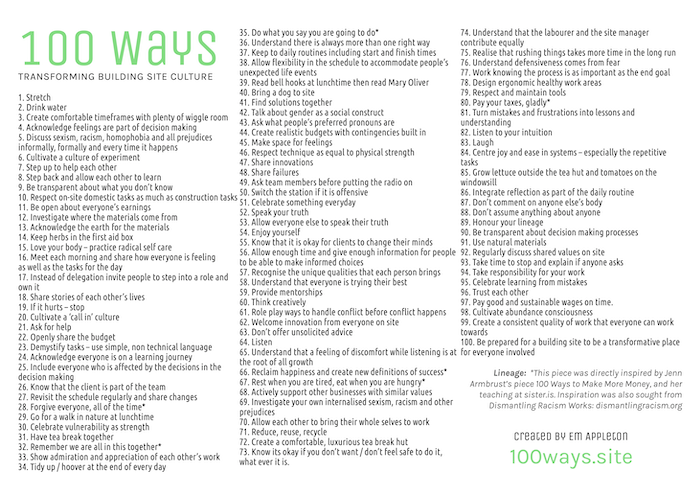“Culture is powerful precisely because it is so present and at the same time so very difficult to identify. […] The longer you swim in a culture the more invisible it becomes.”
Tema Okun, White Supremacy Report, Dismantling Racism Matters

100 Ways is a practice, a reminder to myself, a commitment to transformation, a commitment to social justice work, a plea, a question, an invitation…
and just the beginning.
It is a reminder that I have a body. That I am a person with emotions and feelings, I am sometimes a mess, trying hard, seeing injustice, speaking out, staying quiet, trying to fit in. I am not a machine.
I originally wrote the 100 Ways manifesto after working in the building trades for a few years and I started to notice how the building site culture was escalating the more macho parts of myself.
My body ached but I wouldn’t stop, I kept quiet about my feelings and sensitivities while on site. And the increased sexism, racism and homophobia that I heard on a daily basis was becoming normalised to me.

Join the conversation
How can we work together to transform the culture on our building sites?
Enter your email to receive a print-size download of my 100 Ways poster.
You’ll also get a monthly email exploring how and why we transform building site culture and create working environments that care for us all, along with updates about the project.
Website coming soon at 100ways.site
Why 100 ways?
The nature of sexism and racism and any institutionalised oppression is that it is not isolated to single acts that can be named and stamped out. These oppression are part of the systems we for within, they manifest in a myriad of ways and can only be challenged by a myriad of at least 100 antidotes.
Because there is no one right way, no either/or. To challenge binary thinking we all have to accept that there are many right ways forward. 100, or more, ways.
Because: Number 6. Cultivate a culture of experiment.
As Amanda Palmer says:
You can do nothing
or you can do something
if you do something you will be told you are doing it imperfectly
you will be scolded for getting the tone wrong, the wording wrong, or the timing wrong
do it anyway
do it anyway
keep doing the things
the only alternative is to do nothing, and nowadays thats exactly what nobody needs
keep doing
get it wrong, get it wrong, get wrong
and keep going
the enemy of progress is perfection
keep going keep going.
I love working on building sites.
I love the rough and banter and being outside, even the harsh wind and rain and often the camaraderie that comes with it. I love the tools, the heavy lifting. The technical decision making, the logic, the problem solving. Seeing something grow out of nothing.
This is satisfying work. For hands, mind, body, soul.
I believe that this industry requires a culture shift that supports the bodies working in it.
This is the experiment that I am inviting you to join in with. What does this look like? What does this transformation require from us, the people working in the industry daily?
What are your 100 ways to end the oppressive ways of working on our buildings sites?
Number 1: Stretch.
What ever is going on, I can always come back to number 1.
My body is where my emotions sit. It is where I process what happens throughout the day, the disappointment of making the same mistake again or the joy of finishing a project and handing over to a happy customer. Stretching releases these emotions. Stretching reminds me that my body is not a capitalist machine. Stretching gives me a moment to reflect. Simple, effective.
We have the capacity to create a temporary culture that experiments with the values that we hold true. This requires us to first step back and look at the existing culture head on.
I believe that the building site culture represents a microcosmic version of the larger society we live in. A culture which reflects the dominant ideologies of the patriarchy, white supremacy and capitalism.
I question whether this culture is working for any of us.
The construction industry has the highest rate of suicide than any other industry. It is also a place where 98% of the people working on the tools have been socialised by our patriarchal society to be manly; not to share feelings, be sensitive or to show any weaknesses.